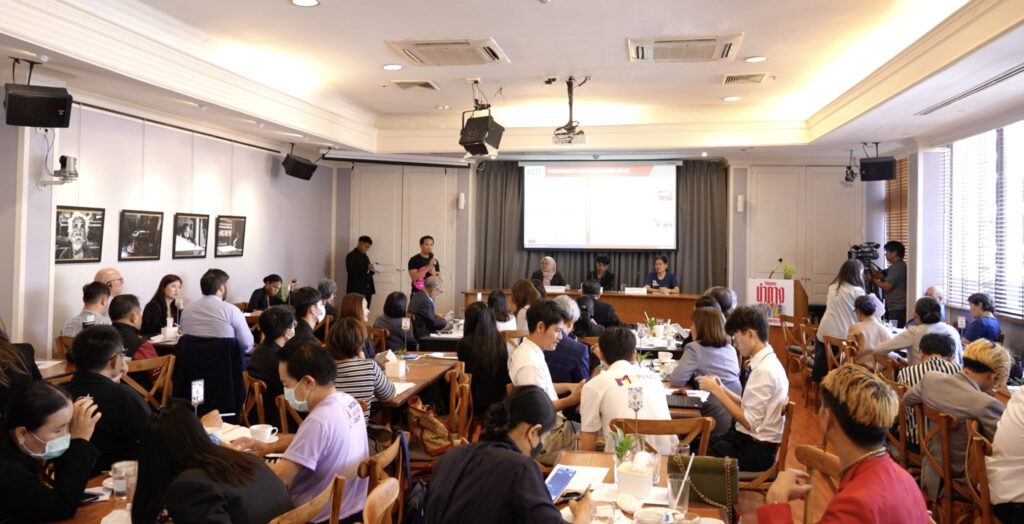In celebration of the World AIDS Day set on December 1, HIV/AIDS advocates call for full investment and policy and legal support in community leadership to accelerate progress towards ending AIDS in the country
HIV/AIDS advocates and leaders in the field have come together ahead of the celebration under the UNAIDS’s theme, Let Communities Lead, to review the situation and discuss critical points to be addressed years ahead to help Thailand achieve its goal of ending AIDS by 2030.
At the FCCT recently, they agreed that community network support to reach HIV/AIDS-infected groups is crucial. According to the advocates, Thailand is on track to meet the 95-95-95 Global AIDS Strategy testing and treatment targets by 2025.
By the end of 2022, an estimated 90% of people living with HIV were aware of their status. 90% of diagnosed people were on treatment and an impressive 97% of those on treatment achieved a suppressed viral load. Viral suppression (dramatically reducing the level of the virus in the blood) makes people living with HIV healthier and sharply reduces the chance that they pass on the virus. People with an undetectable viral load have zero chance of infecting others.
The country is fully committed to ending AIDS as a public health threat as part of the 2030 Sustainable Development Goal agenda. It is internationally recognized for its ‘peer-to-peer’ approach, initiated in 1996. This is a framework that allows people living with HIV (PLHIV) to support each other. This initiative has grown into a network encompassing district, provincial, and national levels, evolving into what is now known as the ‘Comprehensive Care Center’ (CCC). Currently, there are approximately 219 such CCC networks nationwide.
However, HIV/AIDS has still increased among diverse groups, including LGBQI+, people who use drugs, service workers, youth, and migrants. Therefore, promoting community network support to reach these groups is crucial and this support can play a significant role in helping Thailand achieve its goal of ending AIDS by 2030, according to the advocates.
Dr. Patchara Benjarattanaporn, Director of UNAIDS Thailand, underscored the critical role of community involvement in planning, service provision and advocacy. She said communities’ contributions are crucial due to their deep understanding of the needs and barriers faced by key and vulnerable groups such as men who have sex with men, migrants, people who use drugs, service workers, transgender people and youth.
“We have learned a lot and we have implemented a lot that communities can contribute to the HIV response in Thailand. It‘s very clear that if we are able to support the communities to do more and exercise the capacity at the maximum level. I am very clear that Thailand can end AIDS and communities will be the key infrastructure and key strategy to support Thailand to do that,” said Dr. Patchara.

Surang Janyam, Chairperson of the Thai Non-Governmental Organization Coalition on AIDS (TNCA) and Director of the SWING Foundation, emphasized the community’s transformation from service recipients to co-providers, known as Community Health Workers, under Universal Health Coverage (UHC). This transition to Community-led Health Services marks a significant advancement in promoting community sustainability in the AIDS response.
Dr. Yupadee Sirisinsuk, Deputy Secretary-General of the National Health Security Office (NHSO), stressed that Community-led Health Services are key to Thailand’s strategy to end AIDS. In 2023, the NHSO allocates Bt 575.7 million for HIV prevention with Bt 182.25 million of this funding specifically earmarked to support community organizations and NGOs. This approach has successfully reached numerous individuals with HIV prevention and testing services, facilitating faster and more effective treatment access. Currently, 39 community organizations have registered and become service units with the NHSO.
Evidence from the EpiC project, supported by Family Health International (FHI) and the U.S. government’s USAID/PEPFAR program, shows that Key Population-led Health Services achieve far earlier detection of HIV cases when compared to the national average. (The national average CD4 count at initial diagnosis stands at 172 cells/mm³, while for people reached by key population-led health services, it is 429 cells/mm³).
To ensure quality, the Department of Disease Control, Ministry of Public Health (MOPH), Ratchasuda College, Mahidol University, and the Institute for HIV Research and Innovation have developed training curriculums for Community Health Workers. While MOPH established organizational accreditation. Dr. Niti Hetanurak, Deputy Director-General of the Department of Disease Control, Ministry of Public Health said that to date, 497 from MOPH and 88 from Ratchasuda College, in total of 585 Community Health Workers have been trained from these initiatives.
Professor Dr. Praphan Phanuphak, Senior Advisor on Research and Policy at the HIV Research and Innovation Institute and the first doctor to diagnose an AIDS patient in Thailand, remains optimistic about Thailand’s ability to end AIDS. He believes this goal is achievable if policymakers fully invest in community-led responses and all sectors work together to support and revise policies and regulations that currently impede the work of community organizations.
“We just need a strong, genuine political commitment from our government that we can end AIDS within the lifetime within 4 years period of this government by strong advocating on HIV testing. Every Thai person should know their HIV result at least once in their lifetime. This is important because the general population has been left for a long time. We focused on the so-called risk population or key population. Now is the time, you talk about old people, the young generation, and teenagers. These are the general population. So we have to focus on this general population
“The Thai PM should lead Thailand that everyone should have HIV testing once in their lifetime,” said Dr. Praphan.
Satayu Sittikan, Director of the CareMat Foundation in Chiang Mai Province, noted that through Community Led Monitoring and the Stigma Index Survey, they have gathered data that highlights issues faced by the lesbian, gay, bisexual, transgender, queer and intersex (LGBTQI+) community, such as barriers to HIV testing and immediate access to treatment, as well as experiences of stigma and discrimination. These data have led to significant improvements in services at several hospitals in Chiang Mai Province.
Nipakorn Nanta, Chairperson of the Foundation of Women Living with HIV in Thailand, led this survey and expressed pride in Thailand being one of the few countries where women living with HIV spearheaded such efforts. The Stigma Index data amplify previously unheard voices, revealing the impact of stigma and discrimination on pregnant women living with HIV, the complexities related to drug use and sexual and reproductive health.
Dr. Sunthon Sunthornchart, Director of the Health Department of the Bangkok Metropolitan Administration (BMA), highlighted Bangkok’s achievements since joining the Fast Track Cities initiative in 2014. Through robust partnerships with communities and other stakeholders, the city has earned national and international acclaim for its efficient HIV testing, same-day antiretroviral treatment, and the rapid scaling-up of pre-exposure prophylaxis or PrEP. (PrEP is treatment taken by an HIV-negative person to avoid contracting the virus, if exposed.) These efforts have resulted in a decline in new HIV infections, especially among men who have sex with men.
Indie • in-depth online news agency
to “bridge the gap” and “connect the dots” with critical and constructive minds on development and environmental policies in Thailand and the Mekong region; to deliver meaningful messages and create the big picture critical to public understanding and decision-making, thus truly being the public’s critical voice


